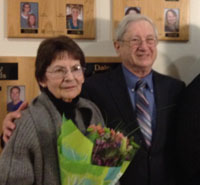

LymphActivist's Site
Dedicated to Lymphedema Patients and the Therapists Who Treat Them


LymphActivist's Site
Dedicated to Lymphedema Patients and the Therapists Who Treat Them
LymphActivist's Site
Dedicated to Lymphedema Patients and the Therapists Who Treat Them
Need for CMS Contractor Education
September 6, 2017
On September 6th I participated in a webinar on Outpatient Therapy Services presented by Noridian Part B (MAC-B) Provider Outreach and Education. A one-hour formal presentation on billing for fee-for-service therapy was followed by an extensive question and answer (Q&A) session. The questions asked were an excellent indication of areas where therapy billing rules may not be clear, and where the Medicare Administrative Contractors (MACs) and CMS might consider internal education efforts to clarify policy. The answers given by the training personnel provided indications as to where MACs themselves may not understand their own policies or be aware of the issues practicing therapists may have.
This education session on outpatient therapy services was especially timely in view of the February 2017 U.S. District Court ruling that CMS’s educational efforts have failed to clarify that there is no therapy “improvement standard”, and that claims processors cannot deny coverage of medically required therapy on the basis that there was no anticipated improvement of functional status http://www.lymphactivist.org/therapy_coverage-judge_accepts_medicare_plan.php. On or about September 3, 2017 CMS complied with the Judge’s order and established an informative web site dedicated to clarifying the maintenance coverage standard https://www.cms.gov/Center/Special-Topic/Jimmo-Center.html.
In this article I abstract some of the questions asked by listeners pertaining to issues likely of interest to lymphedema therapists. I present the MAC-B answers, followed by my comments on the answers. In some cases my questions were not answered since they were probably out of the knowledge range of the Outreach and Education presenters or there has never been a CMS resolution of the issue. I hope that these unanswered questions are elevated to the policy-makers and some resolution is arrived at and conveyed to providers and claims processors. Each question is related to the page number of the presentation. The format is as follows:
Q: Question by listener in the audience
A: Answer by presenter
C: My comments on the issue
Questions Concerning the Jimmo Settlement and the “improvement Standard”
Q: Is “measurable advancement” (is this another name for “improvement”?) required when skilled therapy is provided to prevent declination of medical condition? [Slide 51]
A: Sure..
C: “The settlement agreement is intended to clarify that when skilled services are required in order to provide care that is reasonable and necessary to prevent or slow further deterioration, coverage cannot be denied based on the absence of potential for improvement or restoration..” [Jimmo v. Sebelius Settlement Agreement Fact Sheet]
Q: That is not a correct answer in relation to improvement. Per the Jimmo settlement there is no improvement standard for physical therapy services for Medicare. Prevention of declining condition, if the services are skilled, is covered.
A: Tammy verbally answered....agree!
C: “The manual revisions clarify that a beneficiary’s lack of restoration potential cannot, in itself, serve as the basis for denying coverage…” [Jimmo v. Sebelius Settlement Agreement Program Manual Clarifications Fact Sheet]
Q: APTA information on Jimmo is only available to the 30% PTs who are members. You can go to http://www.lymphactivist.org for open info for non-APTA members.
A: Thanks Robert ...
C: This question was really a comment on the presenter’s suggestion that therapists can go to the APTA web page for information on therapist’s guidelines in applying the Jimmo Settlement.
Question on Post-Payment Medical Review Provider Selection
Q: Lymphedema is a chronic progressive medical condition often requiring maintenance therapy to prevent worsening. Are outpatient lymphedema clinics evaluated against general therapy clinics when evaluating "peer" performance? [Slides 22 & 23]
A: I am not sure of evaluated "peer" performance from Noridian .... it may be happening with post pay reviewers. We can ask Tammy later.
C: The intent of my question was to highlight that therapy for chronic conditions such as lymphedema may be different from therapy for acute conditions, and that this difference should be recognized in the selection of targets for post-payment medical review by evaluating against true “peers”, i.e. other lymphedema providers. But perhaps my question was misdirected to the MAC-B and applies instead to CMS or its Supplemental Medical Review Contractor (SMRC).
Question on Therapy Performed by MDs and NPPs
Q: Why is a physician or NPP allowed to perform and bill for physical therapy services when they are not trained as a PT. I don't perform activities that an MD or NPP would perform because that is out of my scope of practice. [Slide 9]
A: Usually we don't see the physician/NPP performing the PT, but of course they are involved starting the process of the plan of care and establishing PT.
C: I posted “Physiatrists [Physical Medicine and Rehabilitation physicians] are MDs trained in therapy!”
Questions on Billing for Lymphedema Therapy
Q: Manual therapy (CPT 97140) includes complex decongestion therapy (CDT) for treatment of lymphedema. CDT involves compression bandaging. Are strapping codes CPT 29584 usable for strapping services? Are strapping codes CPT 2958x billable by PTs?
A: They should be and depending on the other evaluation that same day...check the CCI to see if a modifier 59 is appropriate.
C: “Application of a multi-layer compression system (CPT codes 29581-29584) includes manual therapy in the anatomic region of the multi-layer compression system. CPT code 97140 (manual therapy techniques...) should not be reported for any type of manual therapy at the same patient encounter in the anatomic region where a multi-layer compression system is applied.” [National Correct Coding Initiative Policy Manual for Medicare Services, Chapter IV, CPT Codes 20000-29999, Section G.17]
Q: Modifier 59---please clarify. Only one manual therapy per day? 97140. How about when billed with 97530? [Slide 59]
A: please check the CCI to see if they can be billed the same day and modifier 59 may/may not be involved.
C: “The NCCI PTP edit with column one CPT code 97140 (Manual therapy techniques, one or more regions, each 15 minutes) and column two CPT code 97530 (Therapeutic activities, direct patient contact, each 15 minutes) is often bypassed by utilizing modifier 59. Use of modifier 59 with the column two CPT code 97530 of this NCCI PTP edit is appropriate only if the two procedures are performed in distinctly different 15 minute intervals. The two codes cannot be reported together if performed during the same 15 minute time interval.” [National Correct Coding Initiative Policy Manual for Medicare Services, Chapter XI, CPT Codes 90000-99999, Section P.4]
Question on Qualifications of Therapist Treating Lymphedema
Q: How do we know whether a lymphedema therapist is "licensed qualified" to perform lymphedema therapy? [Slide 52]
A: They would have to meet the state scope of licensing and enroll with Medicare.
C: Medicare requires that in order to bill Medicare, a therapist must be state-licensed, a graduate of an approved physical therapy program [42 C.F.R. 484.4], and registered with Medicare. The word “qualified” refers to their physical therapy qualifications, and never to their qualifications in the specialty of lymphedema therapy. In fact, there is no Medicare requirement for a therapist providing lymphedema treatment and billing CPT 97140 services to be qualified in these special skills. Therapists certified by a training entity to provide lymphedema services usually have “CLT” behind their names, and therapists with national certification by the Lymphology Association of North America https://www.clt-lana.org/ have “CLT-LANA” behind their name.
Therapy Services prior to Surgery
Q: Should an assessment after surgery (when a pt was seen prior to surgery) be considered a reval or eval?
A: Depends on assessment and why evaluation was prior to surgery.
Q: I noted “Evaluation before surgery--necessary for establishing a lymphedema baseline”.
A: Thanks,
C: Still doesn’t answer the question of the ICD-10-CM to be listed on the claim. In this hypothetical case there has been no diagnosis of lymphedema either before or after surgery, and there is no code for “at risk”.
The preceding material is the opinion of an unpaid patient advocate and may not reflect the positions of any organization or governmental agency. The statements made herein are based on personal experience and research, the Representative’s interpretation of relevant statutes and Medicare policies. Citations are made to primary sources whenever possible.
The foregoing material should not be taken as medical or legal advice. Nor should it be used for billing of Medicare claims.
CPT (Current Procedural Terminology) Copyright Notice Throughout this presentation, CPT codes and descriptions are used to refer to a variety of services. Note that CPT codes and descriptions are copyright 2013 American Medical Association. All rights are reserved. CPT is a registered trademark of the American Medical Association (AMA). Applicable Federal Acquisition Regulations (FAR) and Defense Federal Acquisition Regulations (DFAR) apply.
Robert Weiss, M.S.
10671 Baton Rouge Avenue
Porter Ranch, CA 91326-2905
Tel: 818-368-6340
Fax: 818-368-6432
Email: LymphActivist@aol.com